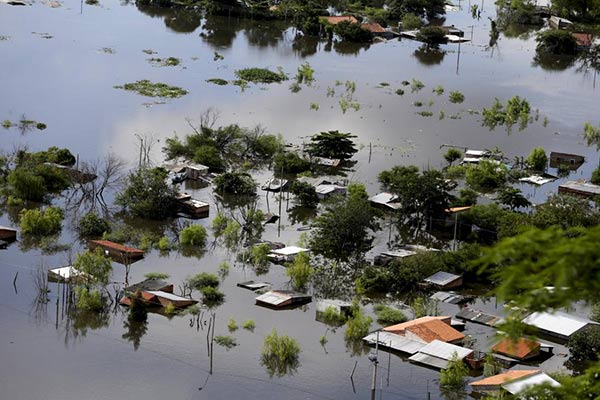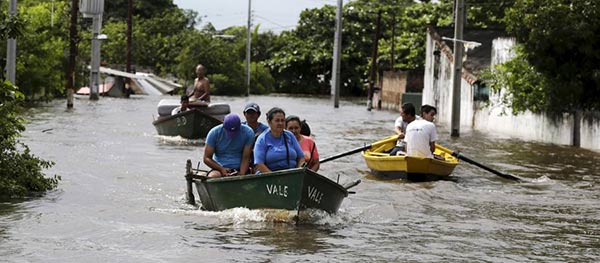Over 100,000 flee flooding in Paraguay, Argentina, Brazil, Uruguay
Updated: 2015-12-28 10:36
(Agencies)
|
||||||||
 |
|
Houses are partially submerged in floodwaters in Asuncion, capital of Paraguay, in this Dec 20, 2015 file photo. [Photo/Agencies] |
ASUNCION/BUENOS AIRES - More than 100,000 people have had to evacuate from their homes in the bordering areas of Paraguay, Uruguay, Brazil and Argentina due to severe flooding in the wake of heavy summer rains brought on by El Nino, authorities said on Saturday.
In the worse affected country, Paraguay, around 90,000 people in the area around the capital city of Asuncion have been evacuated, the municipal Emergencies Office said. Many are poor families living in precarious housing along the banks of the River Paraguay.
The Paraguayan government has declared a state of emergency in Asuncion and seven regions of the country to free up funds to help those affected. Several people have been killed by trees falling in the storms that caused the flooding, local media reported. There was no official death toll yet.
 |
|
People travel on a boat near flood-affected houses in Asuncion, capital of Paraguay, Dec 27, 2015. [Photo/Agencies] |
In Alberdi, some 120 kilometers (75 miles) south of Asuncion, the government recommended that several thousand more people living along the banks of the River Paraguay evacuate.
"(The flooding) was directly influenced by the El Nino phenomenon which has intensified the frequency and intensity of rains," the national Emergencies Office said.
This year's "El Nino," which sparks global climate extremes, is the worst in more than 15 years, the UN weather agency, the World Meteorological Organization (WMO), said last month.
"Severe droughts and devastating flooding being experienced throughout the tropics and sub-tropical zones bear the hallmarks of this El Nino, which is the strongest in more than 15 years," WMO chief Michel Jarraud said in a statement.
Officials at Paraguay's Emergencies Office said the river might rise even more in the coming days, stabilizing and falling back towards normal levels from January onwards.
- Fifteen dead as South Carolina gripped by historic flooding
- Over 100,000 flee flooding north of Tokyo
- Myanmar's severe flooding affects 1 mln nationwide: ministry
- China ready to help flooding Myanmar
- More, larger drainage pipes not the solution to urban flooding, official says
- Deadly flooding hits Fujian province
- Rescuers help people flee flooding as typhoon hits Zhejiang province
- More aid from China set for Syria
- Japanese journalist reportedly being held in Syria
- New York City has warmest Christmas Eve on record
- One dead as fight leads to fatal shooting at North Carolina mall
- Trump's lead bodes well for Hillary Clinton's presidential bid
- Spanish Socialist leader insists no support for Rajoy

 China's top scientific achievements in 2015
China's top scientific achievements in 2015
 Yearend 2015: A picture and its story
Yearend 2015: A picture and its story
 Christmas celebrated across the world
Christmas celebrated across the world
 HK car show kicks off during Christmas season
HK car show kicks off during Christmas season
 10 major economic policies that will make a difference on lives
10 major economic policies that will make a difference on lives
 Santa Claus is busy in China
Santa Claus is busy in China
 Yearend 2015: Heartstopping images captured by daredevils
Yearend 2015: Heartstopping images captured by daredevils
 Girl becomes youngest Master of Memory
Girl becomes youngest Master of Memory
Most Viewed
Editor's Picks

|

|

|

|

|

|
Today's Top News
Shooting rampage at US social services agency leaves 14 dead
Chinese bargain hunters are changing the retail game
Chinese president arrives in Turkey for G20 summit
Islamic State claims responsibility for Paris attacks
Obama, Netanyahu at White House seek to mend US-Israel ties
China, not Canada, is top US trade partner
Tu first Chinese to win Nobel Prize in Medicine
Huntsman says Sino-US relationship needs common goals
US Weekly

|

|







